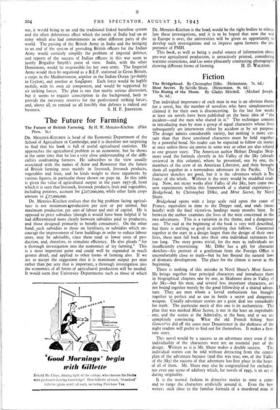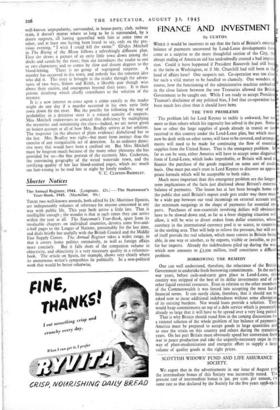Fiction
THE individual importance of each man in war is an obvious theme for a novel, but the number of novelists who have simultaneously claimed it for their own is disconcerting. In the last few weeks at least six novels have been published on the basic idea of " the incident—and the men who shared in it." The technique consists in introducing man by man a group of equal characters whose lives subsequently are interwoven either by accident or by set purpose. The design admits considerable variety, but nothing is more cer- tain than that these unrelated characters must be held together by a powerful bond. No reader can be expected to follow six stories at once unless those six stories in some way or other are also related to one greater story. The American author Hobart Douglas Skid- more used the formula cleverly in his Valley of the Sky (already reviewed in this column), where he presented, one by one, the members of the crew of an American Liberator, and then brought them all together in a tremendous adventure in the Pacific. The character sketches are good, but it is the adventure which is the frame of the whole. Without it the story would be muddled read- ing. Now, not many weeks after Valley of the Sky, here come two new experiments within this framework of a shared experience— Bridgehead, by Christopher Dilke, and Most Secret, by Nevil Shute.
Bridgehead opens with a large scale raid upon the coast of France, equivalent in time to the Dieppe raid, and ends (more briefly) with the final victorious landings many months later. In between the author examines the lives of the men concerned in the two adventures. This is a variation in the theme, and a dangerous one. The raid at the beginning of the book is very well described, but there is nothing so good in anything that follows. Connected together at the start in a design larger than the design of their own lives, these men fall back into their own individual existences for too long. The story grows trivial, for the men as individuals are insufficiently entertaining. Mr. Dilke has a gift for character sketches—his portrait of a gentleman from the Foreign Office is uncomfortably close to truth—but he has flouted the natural laws of dramatic development. The place for the climax is never at the beginning.
There is nothing of, this mistake in Nevil Shute's Most Secret. He brings together four principal characters and introduces them in biographical chapters one by one, as Skidmore does in Valley of the Sky—but his men, and several less important characters, are not bound together merely by the good fellowship of a shared adven- ture. They are men whom a fervid enthusiasm has brought together to perfect and to use in battle a secret and dangerous weapon. Usually adventure stories are a great deal too remarkable for truth. The particular merit of this one is its authenticity. The plan that was marked Most Secret, is not in the least an improbable one, and the scenes at the Admiralty, at the base, and at sea are completely convincing. What the old French fishing boat Genevieve did off the coast near Douarnenez in the darkness of the night readers will prefer to find out for themselves. It makes a first- rate story.
This novel would be a success as an adventure story even if the individuality of the characters were not an essential part of the design. Written as it is Mr. Shute makes a double success. The individual stories can be told without detracting from the central plan of the adventure because (and this was true, too, of the Vallel of the Sky) the success of that adventure has first place in the heart. of all of them. Mr. Shute may also be congratulated for excluding not even one scene of adultery which, for novels of 1945, is an act of daring originality.
It is the normal fashion in detective stories to state a. crime and to range the characters artificially around it. Even the best writers. stick close to the familiar formula of a murdered man of
II
is
2'
21 21 2!
3( 3]
well-known unpopularity, surrounded, in house-party, club, railway train, it doesn't matter where so long as he is surrounded, by a dozen suspects, all having quarrelled with him at some time or • other, and at least one having been heard to say, only on the pre- vious
evening, " I wish I could kill the swine." Gladys Mitchell in The Rising of the Moon follows a refreshingly different plan. First she draws a picture of an eerie little town down among the docks and canals by the river; then she introduce; the reader to one or two characters; and so comes by slow and decent degrees to the
blood-letting. There is no group of segregated suspects. A murder has occurred in the town, and nobody has the remotest idea who did it. The story is brought to the reader through the adven- tures of two boys, Sinion and Keith, a likeable pair though wise above their station, and courageous beyond their years. It is their private sleuthing which chiefly contributes to the solution of the mystery. It is a new interest to come upon a crime exactly as the reader might do any day if a murder occurred in his own eerie little town down by the river. But the penalty for following the way of probability in .a detettivx story is a natural scarcity of suspects. Miss Mitchell endeavours to conceal this deficiency by multiplying the mysteries and minimising the clues—indeed, we are never given an honest account at all of how Mrs. Bradley arrives at her solution. The inspector (in the absence of plain evidence) disbelieved her to the last. Mrs. Bradley was right—but more from instinct than the exercise of any recognisable act of detection. In an ordinary deter= tive story this would have been a cardinal sin. But Miss Mitchell must be forgiven much because of the many other pleasures she has provided for us—the fine portrait of the eccentric Mrs. Cockerton, the convincing geography of the weird waterside town, and the terrifying quality of her last blood-stained pages, which are much too hair-raising to be read late at night by lonely readers.
V. C. CLINTON-BADDELEY.



























 Previous page
Previous page